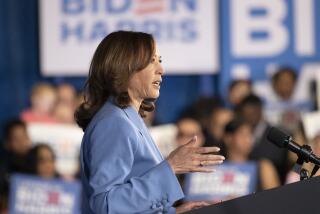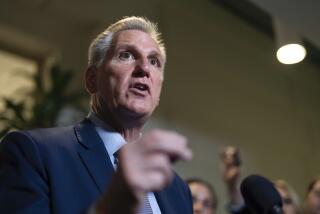Republican leaders try to make payroll tax break palatable
Facing Republican resistance to extending a payroll tax holiday, House Speaker John A. Boehner is considering sweetening the package for his party members with legislation that would advance the controversial Keystone XL pipeline.
Failure by Congress to approve an extension of the payroll tax break before it expires at the end of the year would result in an average $1,000 annual tax hike on 160 million American workers.
The prospect of that politically unpopular outcome has led GOP leaders to coalesce around President Obama’s proposal to continue the tax break for 2012. But opposition from rank-and-file members spilled out Friday from a closed-door meeting of House Republicans, showing the difficulty Boehner once again faces in rallying his troops on economic issues.
The depth of the resistance also was on display in the Senate this week, where a majority of Republicans rejected not only a Democratic proposal to pay for the payroll tax break by raising taxes on people who make more than $1 million a year, but also the GOP’s plan to fund it with other spending reductions.
The dissent has put Republicans in the unusual position of fighting a tax break — a rarity that Democrats are highlighting given that the GOP historically has made low taxes a hallmark of its platform.
“I’m just not sold on this payroll tax extension, this unemployment extension,” said Rep. Allen West, a freshman Republican from Florida, who said his views during the meeting were not in the minority among Republican lawmakers. “We’re broke.”
Boehner and House leaders are compiling a package, to be unveiled next week, that would extend the payroll tax break, unemployment insurance benefits and a routine pay adjustment for doctors who handle Medicare patients.
Extending the payroll tax would cost $112 billion, but the total cost of the provisions was not immediately available. Republicans would offset the spending by choosing from a menu of domestic spending cuts presented to lawmakers on Friday, with the largest cut the continuation of Obama’s salary freeze for federal workers. Republicans in the Senate similarly sought to halt pay raises, as is already being done for this year and next.
To attract Republican votes, Boehner is expected to tack on legislation that would advance the development of the Keystone XL pipeline, a heated environmental issue that the Obama administration has put on hold until after the 2012 election.
Republicans say building the pipeline to bring oil from Canada to the U.S. would create jobs, but environmentalists and some officials in states along the proposed route are concerned about potential environmental damage, including to drinking water supplies.
Attaching a Keystone measure, as well as another GOP-led bill to roll back regulations on boiler emissions, is an attempt to win over Republicans and drive a wedge between Democrats, who are divided on these issues.
The package would also contain changes to the unemployment insurance program that could involve work requirements for benefit recipients. Obama had suggested similar changes.
As has been the case for much of the year on budget issues, Boehner might need some Democratic votes, forcing him to strike a political balance to pass a package in the face of resistance from his majority.
For Republicans, simply paying for the payroll tax break is not enough to attract conservatives who doubt the economic value of the break, which in 2011 lowered the 6.2% tax workers pay toward Social Security to 4.2%.
Those opponents, and some liberal Democrats, worry that reducing the Social Security revenue stream would harm the retirement trust fund. Leaders’ insistence that those funds would be replenished — this year with general fund reimbursements and next year with spending cuts elsewhere in the budget — is often ignored.
Republican leaders now are trying to convince their rank and file that the more pressing issue is to avoid the political and economic fallout from a tax hike on workers that would start on Jan. 1.
Economists say failure to continue the tax break could cut in half the nation’s already-weak economic growth forecast for 2012. They argue that the tax break — and continued unemployment benefits, which are expiring for about 2 million Americans — stimulate the economy by putting money in the pockets of people who will spend it.
More to Read
Sign up for Essential California
The most important California stories and recommendations in your inbox every morning.
You may occasionally receive promotional content from the Los Angeles Times.











